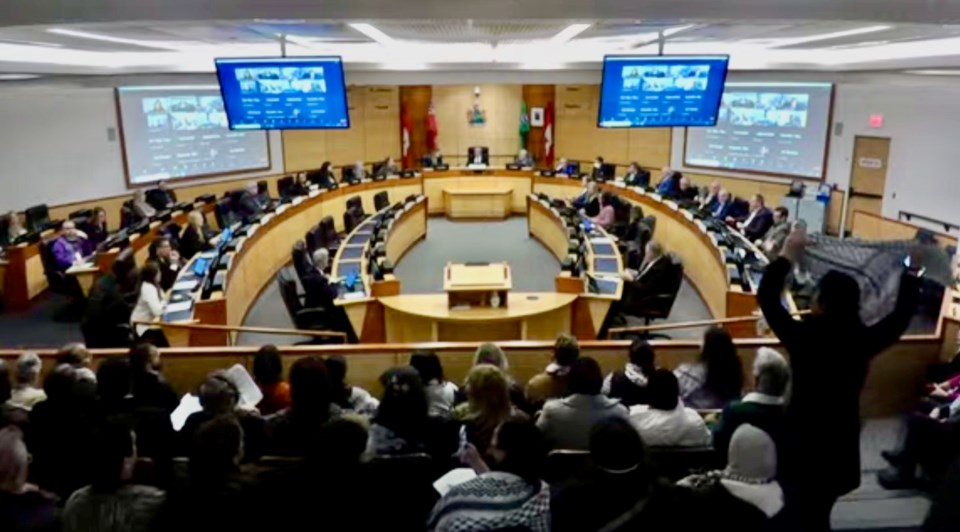The council chamber at Niagara Region headquarters was in an uproar Thursday after council chose to remove an item from the agenda, a motion brought forward by St. Catharines representative Haley Bateman asking the regional government to call for an immediate ceasefire in the Palestine-Israel conflict.
At the start of the meeting, St. Catharines mayor Mat Siscoe made a motion to have Bateman’s proposed recommendations removed from the agenda, which were to be considered several items down the list of items on the agenda.
“This matter does not pertain to any area of Niagara Region business or mandate,” said Siscoe.
“The end result would be division in our community,” regardless of how council ended up voting on the matter later in the evening, he said.
A recorded vote on whether or not to call the question was supported by 24 members of council, opposed by only Bateman and Niagara-on-the-Lake Regional Coun. Andrea Kaiser, eliminating the possibility of further discussion.
A vote to strike Bateman’s motion from the agenda was also supported by council, leading to chair Jim Bradley informing the packed gallery that registered speakers would also not be able to make presentations.
There were 18 people listed as speakers to address the issue.
This prompted dozens of people in the gallery to become frustrated, repeatedly shouting “cease fire now.”
Chair Bradley then declared a 10-minute recess, saying that regional council’s procedural bylaw does not permit delegations speaking to non-agenda items.
On the livestream of the meeting, Bateman could be seen walking out of the chamber after council voted.
Social media quickly picked up on what was happening at the regional council meeting, the crowd that had gathered outside the headquarters to protest the decision made, and the speeches that were then delivered outside by people who were signed up to speak at the meeting.
Kaiser said she voted against calling the question in order to generate more discussion, and also did not support Bateman’s motion being wiped off the agenda.
But she’s “not faulting anyone” and can see why others voted differently.
“I do understand the rationale behind both perspectives,” she told The Local on Friday. She also understands there is a “time and a place” for certain discussions, she added.
But council has previously discussed motions regarding the Ukrainian-Russian conflict, which to her is one reason why the motion her fellow councillor was putting on the table should not have been dismissed.
“As a councillor, I’d like to be consistent with that,” said Kaiser. “If we decide that’s not in our lane, then we should do that across the board.”
Asked whether she believed Bateman’s motion could result in the federal government taking action, she said there were parts of the motion that she did not support.
“But we never got to that conversation,” she said.
A news release late Thursday night from the Niagara Movement for Justice in Palestine Israel said that once delegates were told they were unable to speak to Council, delegates and audience members gathered outside “in an impromptu rally to make the speeches they were denied by council.”
“The Niagara Region,” the statement continues, “has lit their headquarters in the colours of Israel’s flag ‘as a symbol of solidarity with Israel, and Niagara’s Jewish residents.” Bateman's motion had included calling for "similar lighting in the colours of the Palestinian flag, done earlier by Edmonton, for Palestine and Niagara’s nearly 500 residents of Palestinian origin.”
Bateman’s recommendation began with a request that council “offers support” to all the Israelis and Palestinian Canadians living in Niagara.
Bateman’s motion asked that the Region ask the federal government to remove the cap on the “number of Palestinians who can seek refuge with their Canadian extended family members from the violence in the Gaza Strip.” The motion said “many organizations who support those who have been so deeply affected have noted that that number is insufficient and not reflective of the extent of the crisis.”
In addition, her motion requested that the region ask the federal government to treat those leaving the conflict zones and Palestinian territories as Ukrainians leaving that conflict, “including the removal of application fees, and social assistance when they arrive to Canada.
Bateman said in her motion that is not intended to foster racism, antisemitism and targeting of Jewish people living in Niagara, anti-Palestinian racism or Islamophobia.
“Instead, it is a reason to show solidarity and compassion for those who are living in Israel and Palestine.”
Bateman told The Local Friday morning that her motion being blocked was calculated, and that there still should have been a conversation.
“Many motions come to council that are not exactly within our mandate, but we discuss, and we vote,” she said. “My colleagues did not afford me that opportunity and did not afford residents an opportunity to speak to their experiences as Palestinians and Israelis living in Niagara,” she added.
If her motion were to have passed, she said it would have shown Palestinian residents that Niagara Region is “empathetic to all they are going through,” and supportive of Humanitarian aid efforts to getting their loved ones what they need.
In response to Siscoe’s comment that the motion being debated would cause divide in Niagara, she said his position is “not a reflection of our community,” and that what she feels is most unfortunate is that people who wanted to be heard were not.



